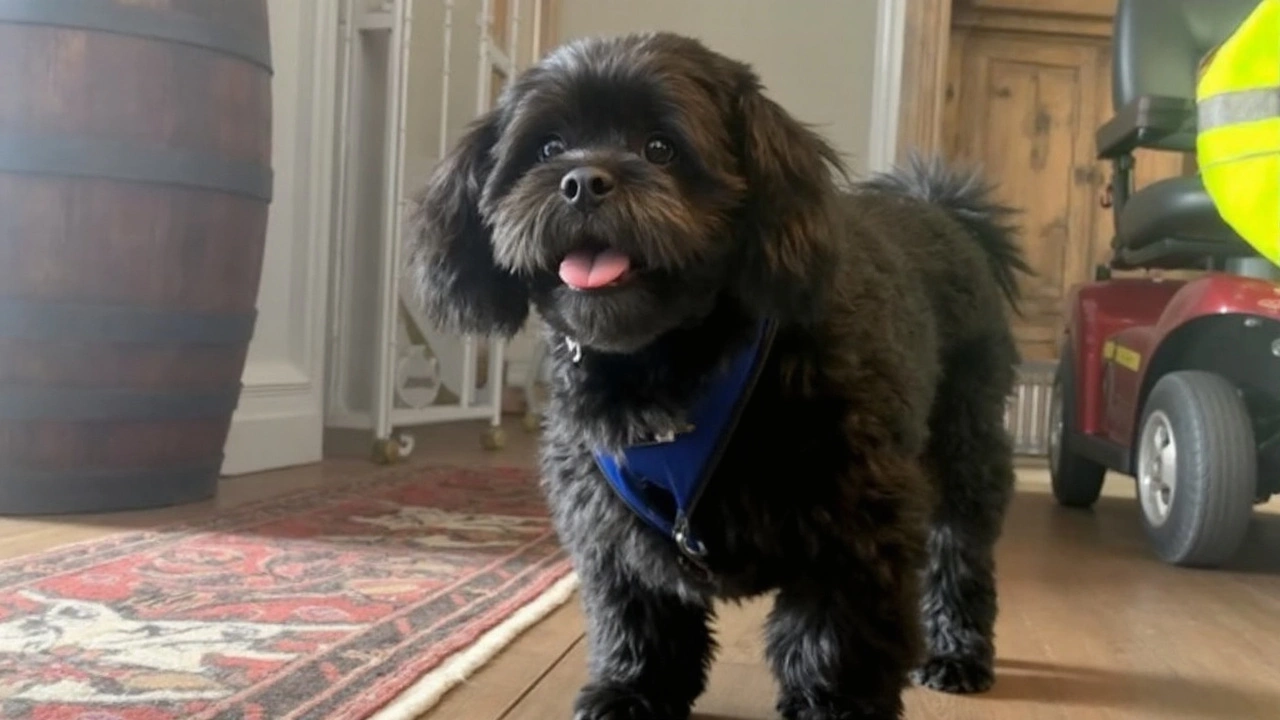 10
Sep,2025
10
Sep,2025
A small dog sprinted into a packed bar on a match day and never left. That is the simple, startling start to Rex’s story — a two-year-old Shih Tzu who turned up at The Leaping Wolf in Wolverhampton and, within hours, lost his owner but found a new home.
Staff at the Wolverhampton pub remember the moment clearly: Liverpool were playing, the place was rammed inside and out, and a nervous little dog suddenly shot through the door like he owned the place. He didn’t. He had just run from something terrible.
A frantic arrival, a tragic truth
When Rex appeared in September 2024, customers clocked him first — a blur under tables and bar stools, skittering across the floor. The team called manager Dan Morris, 33, who set about the awkward task of catching a scared animal in a crowded room. After a careful chase around chairs and feet, he scooped Rex up and drove him straight to a local vet.
That decision was key. In England, anyone who finds a stray dog should contact the local dog warden or a vet, who will check for a microchip and try to reach the owner. Vets also scan for injuries and stress. Rex was shaken but physically fine. The chip scan produced an owner’s details — and then a shock. The person linked to Rex had been killed in a car crash not long before the dog ran into the pub.
With that, the situation changed from a simple stray to a dog with no one to go home to. Staff say the room went quiet when the vet explained it. Rex needed a guardian, fast. Adoption paperwork doesn’t get signed in a minute, but decisions do. Dan made one: Rex wasn’t going back out on the street.
From there, the practical steps fell into place. The vet confirmed Rex’s health, the chip details would be updated with a new keeper, and the local authority informed. Standard stuff — but with a human weight behind it. A dog had lost his person on a busy road somewhere; now he was curled like a comma in a pub manager’s arms.
Back at The Leaping Wolf, staff set up a quiet corner with water, a blanket, and space to decompress. New smells, new faces, loud TV, clinking glasses — a lot to process for a small dog on a loud night. Regulars held back and let him breathe. The first thing Rex ate, someone jokes, might have been a corner of a chip that got away.

From stray to staff: life at The Leaping Wolf
Rex lives at the pub now. He’s a familiar face to regulars, soft ears bobbing as he patrols the front and snoozes by the end of the bar. Staff describe him as calm but alert, especially at the door. He isn’t a guard dog in any formal sense — he’s a Shih Tzu — but he’s become something of a deterrent anyway. Dogs read people. Rex seems to know when someone’s energy is off, and more than a few customers have joked that he can “sniff out the undesirables.” The bar has found that a friendly, visible dog nudges the room toward better behavior without a word.
He has a routine. Mornings are for gentle walks and a nose around the delivery crates. Afternoons bring a nap in the patch of sun near the window. Evenings, he stations himself near the entrance as people arrive, tail wagging, a quick check of shoes and trousers like he’s taking attendance. Match days are busy, so the team gives him a safe spot behind the bar during peak noise and lets him meet people in calmer moments.
There’s been a learning curve. Pubs can be a sensory overload for dogs: bass from speakers, sudden cheers, shifting crowds. Staff keep water bowls out, make sure there’s a quiet area, and watch for signs of stress — yawning, lip-licking, and that fixed stare dogs get when they need space. If it’s too much, Rex gets a break in the back room or a walk around the block.
Community response has been warm and practical. Regulars bring treats, but only ones cleared by the team. Kids ask to say hello, and staff teach them to offer a hand low and wait. Rex enjoys gentle attention, then he’s done; he wanders off when he’s had enough. Those boundaries matter. The goal isn’t to turn him into a prop. He’s a resident, not a gimmick, and the pub treats him that way.
Behind the scenes, the admin followed the emotions. Microchip details were updated to reflect his new keeper. Insurance was sorted. A basic vet plan was set up for check-ups, vaccinations, and the small dog things that crop up. Rex had already been neutered, which helps with settling in. He’s two, so still young enough to adapt fast, old enough to know he’s safe now.
Why do pub dogs work so well in Britain? Tradition plays a part. Many pubs allow dogs at the landlord’s discretion, and plenty of venues blend hospitality with a resident animal. The formula is simple: clear house rules, hygiene kept tight, and careful handling. A bowl of water, well-placed signage, and a manager who knows when a room needs quiet can make a big difference to both the dog and the customers.
Rex’s story hits a deeper chord, though. It’s about what people do when they’re handed a hard moment. Dan didn’t plan to adopt a dog that night. No one at The Leaping Wolf had time to prepare a policy for “unexpected canine arrival following a fatal crash.” They just chose care and kept going.
There’s a practical upshot to that care. A friendly, steady animal changes a room. Customers relax. Staff have a pleasant focal point in a tough shift. Tense conversations tend to ease when a small dog looks up at you like you might have a biscuit. It’s not magic, but it’s close.
If a stray dog ever runs into your business or home, the playbook is straightforward:
- Get the dog safe and calm: close doors, move slowly, offer water.
- Call a vet or your local dog warden: they can scan for a microchip.
- Check for injuries and keep noise low.
- Avoid feeding large meals until a vet gives the all-clear.
- If the owner can’t be found, discuss legal next steps with the local authority or a rescue before making long-term plans.
Rex didn’t need a kennel or a foster network in the end. He needed a decision and a place to be. The Leaping Wolf had both. What followed was the slow work of settling in: a bed behind the bar, a routine that matched opening hours, a handful of toys, and a quiet spot to disappear to when the volume climbed.
Ask around and people will tell you Rex is part of the furniture now — in the best sense. He pads between tables like he’s counting legs. He takes a lazy interest in the beer mats. He has a favorite stool. He also has a job of sorts: greet, observe, de-escalate with charm when necessary. On paper, he’s a rescue. In reality, he rescued the room a bit as well.
The day that changed everything for him still echoes. A life ended on the road, and a small life kept going. The gap between those two facts is where people stepped in: the customers who made space, the vet who moved quickly, and a manager who decided a dog could be family.
For a while, Rex slept lightly and started at loud cheers. That has eased. He now takes big, contented naps even when the crowd swells for a late kick-off. He wakes for the halftime walk, checks the pavement like a tiny usher, and heads back inside. The bell rings, the screens glow, and a small dog settles into his corner like he’s always belonged there.
At The Leaping Wolf, the staff didn’t set out to build a mascot. They were busy enough pouring pints. They ended up with a story people want to be part of — a reminder that care, given quickly and quietly, can change a life and lift a room. The “security guard” bit is a wink, sure. But on some nights, when the noise spikes and tempers shorten, it’s the smallest employee who keeps things steady.




